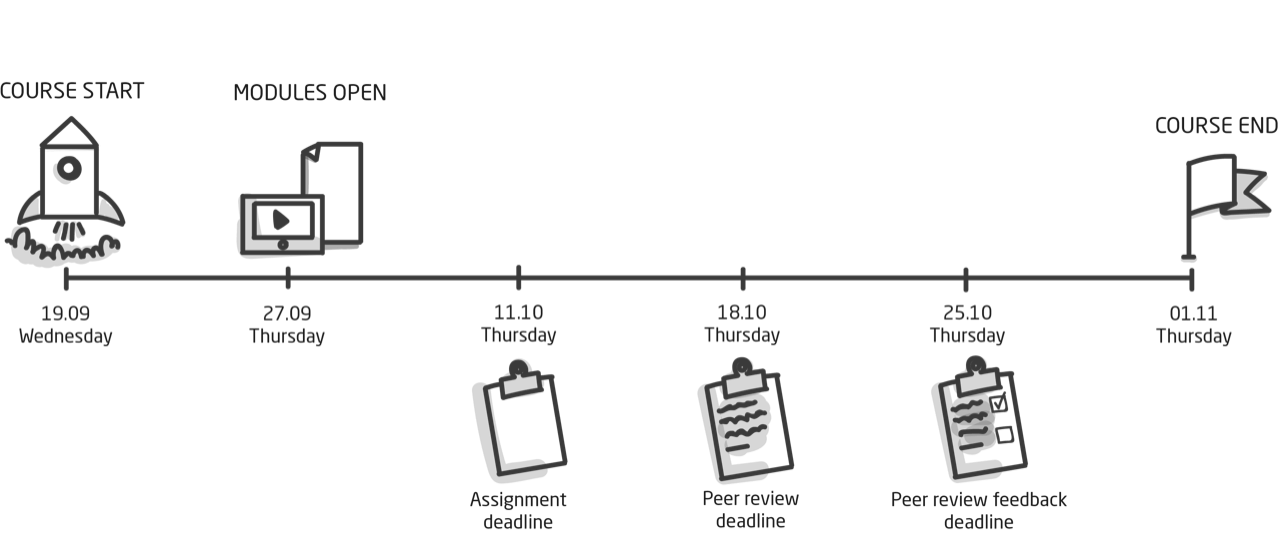Your browser is not fully supported!
You are running an outdated browser version, which is not fully supported by openHPI. You might not be able to use crucial functionality such as the submission of quizzes. Please update your browser to the latest version before you continue (we recommend Mozilla Firefox or Google Chrome).

Make sense of design research data, learn to frame a problem from a user's perspective, and generate lots of new ideas: This course will introduce you to the basics of design synthesis and brainstorming techniques.
Language: English
English
Advanced, Beginner
Course information
This course introduces you to helpful skills for advancing from user research to idea generation. We take a task-based approach to build your skills: You will interpret research findings, frame user-centered problem statements, and facilitate creative brainstorming sessions. This MOOC builds on the 2017 “Inspirations for Design” course, but you may also run through it as a stand-alone MOOC. You can take part in this course individually.
Learning Objectives
- sort data and extract needs from user research
- frame a problem from a user's perspective
- apply various brainstorming techniques and principles
- select and conceptualize ideas
- evaluate the quality of your peers' work and provide constructive feedback
Course Structure
WELCOME AND INTRODUCTION / Week 1 (19.9. – 26.9.2018)
During the welcome week, you will have the chance to introduce yourself and to discover the learning environment with a warm-up exercise.
Time commitment: 1h – 1:30h
DEFINE / Week 2 (27.9. – 3.10.2018)
In this week, we focus on the skill of framing a problem from the user perspective. You will learn about the basic steps of identifying "golden nuggets" and phrasing a "How might we" question.
Time commitment: 2,5h – 3,5h
IDEATE / Week 3 (4.10. – 11.10.2018)
In this week, we focus on the skill of facilitating a brainstorming session: You will learn about brainstorming techniques and idea selection techniques, and how to lead your own idea generation group.
Time commitment: 3,5 - 5h
WRAP UP / Week 4 (and beyond) (12.10. – 24.10.2018)
During the wrap-up week, we will provide a summary of what you have learned. We will discuss assignment results and describe the next steps in a design thinking project.
Time commitment: 0:30h – 1h

Target Audience
This course is best suited for those who are curious about design thinking and human-centered approaches for solving problems. No prior knowledge is required. This course is designed for individual work; it is not necessary to find a team of co-participants. Peer reviews will be allocated to your online peers.
Inspirations for Design: Learner Voices
“I think this MOOC is suitable for a broad audience and anyone can relate to it, even beginners.”
“The way the skills are taught in this MOOC can be learned by anyone, no matter which country you are from, which culture you belong to or in which context you want to use the design skills.”
“This course helped me a lot in making decisions and finding inspiration. It opened up my prior assumption of design thinking and made me realize that design thinking is not limited to one specific scientific category.”
HCD: From Synthesis to Creative Ideas: Learner Voices
“I have already changed my own way of working since I started learning about human-centered design.”
“I already work in the field of Design Thinking, but this course confirmed me in my work.”
“I will incorporate the design thinking mindset in the next project I will be working on to come up with a more customer oriented solution!”
“The course and format are both excellent.”
Other MOOCs
You can find our other MOOCs here
1. Inspirations for Design: A Course on Human-Centered Research
2. Human-Centered Design: Building and Testing Prototypes
Note
This course is part of a research project that investigates the potentials and challenges of teaching design thinking in an online environment. Therefore your participation in the course surveys and feedback are very valuable to us.
Attention: This course is currently in self-study mode, in which you do not have access to graded assignments/exams. Therefore, we can only issue you a certificate of participation.
Enroll me for this course
Learners
Rating
This course was rated with 5.0 stars in average from 1 votes.
Certificate Requirements
- Gain a Record of Achievement by earning at least 50% of the maximum number of points from all graded assignments.
- Gain a Confirmation of Participation by completing at least 50% of the course material.
- Gain an Open Badge by completing the course.
Find out more in the certificate guidelines.
This course is offered by

Karen von Schmieden is a PhD candidate in the HPI-Stanford Design Thinking Research Program and a curator and editor of ThisIsDesignThinking.net. She has worked as a journalist and in a startup for radio technology. Karen is an alumna of the HPI School of Design Thinking, where she designed human-centered solutions in projects for Charité Berlin and the Rundfunk Berlin-Brandenburg. She studied in Maastricht, Istanbul and Lisbon and holds an M.A. in European Studies on Society, Science and Technology. She’s a co-founder of the student-led innovation group „Maastricht Disrupt“.

Mana Taheri is a PhD candidate at the HPI-Stanford Design Thinking Research Program. Her research interests lie in the fields of e-learning and cultural diversity. In her research projects she investigates the potentials and challenges of teaching design thinking at scale and to a global audience with diverse cultural backgrounds. Mana is also a member of the teaching team at the HPI School of Design Thinking in Potsdam, Germany. She is well experienced in designing and leading workshops in various international settings, from Tehran, to Berlin, and to Havana. Mana was born and raised in Tehran, where she earned a Bachelor’s degree in Economics before moving to Berlin to complete her Master’s in Economics and Management at Humboldt University.

Lena Mayer is a PhD candidate at the HPI-Stanford Design Thinking Research Program. Her research interests lie in organizational training and (virtual) team collaboration. Lena also works as a freelance design thinking coach for organizations and universities. She graduated from Maastricht University with a M.Sc. in Work and Organizational Psychology and is currently also following a further education program in systemic communication. In the past, she has worked in several interdisciplinary design projects, as a tutor and in the field of consultancy.